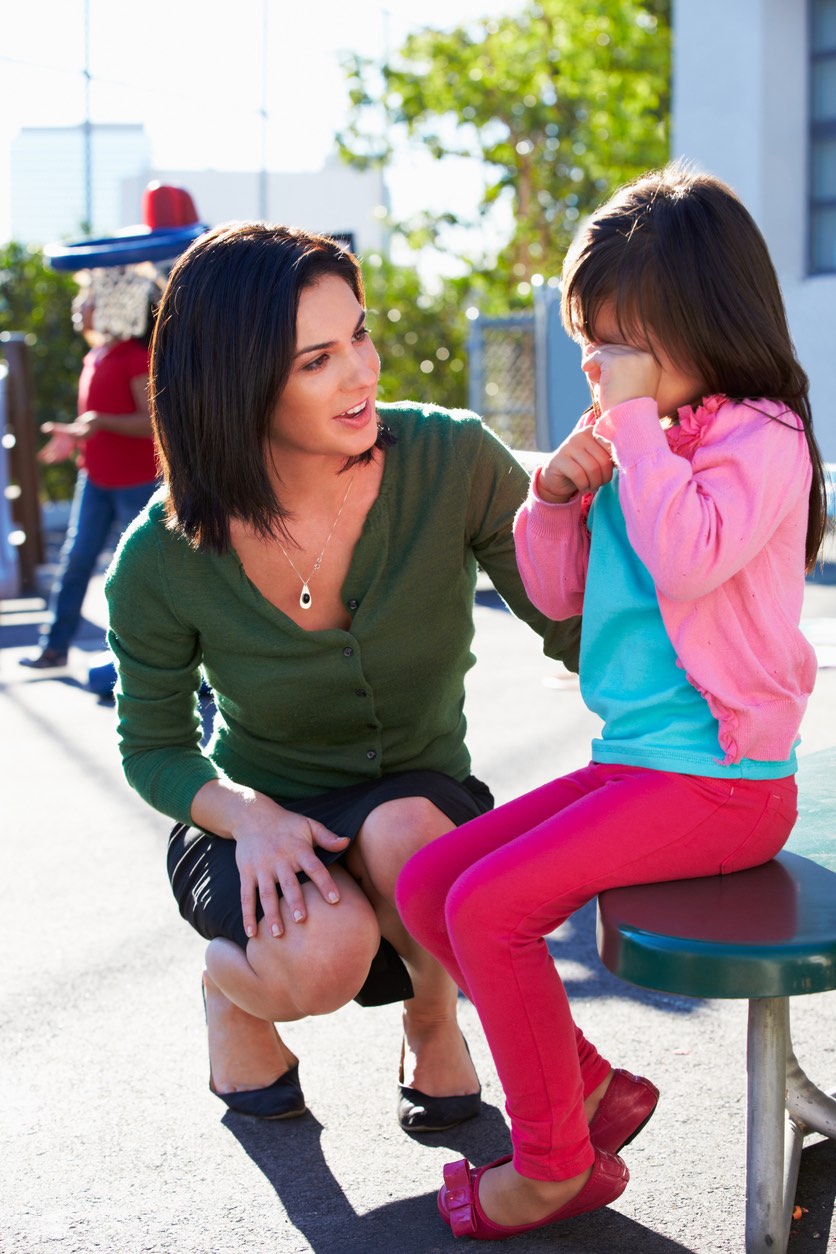As a parent, you get to deal with BIG emotions on a daily basis. And sometimes, in the heat of the moment, you might find yourself using some less than positive phrases to address those emotions.
Your children are still learning how to navigate the world. So it makes sense that they’ll get tired, overwhelmed and frustrated.
Which inevitably leads to whining, temper tantrums and tears.
Some days it can feel like TOO MUCH. And after multiple outbursts, you just give in to your child’s demands to make them stop crying.
On other days you might lose it all together, break down and yell some less than positive phrases at your kids like, “Stop crying!” or “Stop that noise!”
Or the old-school favorite “If you don’t stop, I’ll really give you something to cry about!”
Want to RAISE successful and happy adults? FIND OUT HOW NOW!
It’s so easy to feel like there are only two options.
Give in to your child’s cries, thereby reinforcing the behavior, or yell at your child to scare them into compliance.
But in reality there is an amazing third option!
An option that doesn’t spoil, scare or isolate your child. One that uses positive phrases, rather than negativity, to get results.
That option is EMPATHY, and it’s a game-changer for parents.
Why Empathy Works
Your toddler is cranky. The smallest thing sends them over the edge into a wailing, crying fit.
It may seem like they’re trying to manipulate you, or make your life difficult, but really they’re not. Your child is just overwhelmed.
When kids “act up” a lot of us were taught (by our own parents) that discipline or punishment is what’s needed to get a child’s behavior back on track. In other words, spare the rod, spoil the child.
But providing comfort and support instead of yelling “stop crying!” won’t cause your kids to have more meltdowns in the future.
In fact, the opposite is true.
RELATED: Toddler Terrible Twos: My Child Says No! All The Time
Your child NEEDS support during times of stress. Showing empathy and affection gives your child a feeling of safety and understanding.
By showing your child empathy, you are meeting their needs.
If your child doesn’t get that feeling of connection from you, they’ll just keep trying… which means more crying and acting out. This is one of the core concepts of positive parenting.
It’s also the reason “stop crying!” doesn’t work long term.
Crying Is Okay
When you dismiss or minimize your child’s feelings, by yelling “stop crying” for example, you’re actually making your job harder.
Rarely will the crying stop. And your child will likely need more support from you in the future, not less.
And I’m sure none of us want to dismiss our kids’ feelings.
Crying is a healthy, natural emotional release for kids. By telling kids to stop, we’re basically saying their feelings aren’t important.
A child’s perspective of the world is very different from yours.
Something that may seem trivial to you is a BIG DEAL in their little minds. What they’re crying about matters to them!
RELATED: How To Handle Temper Tantrums In Toddlers
As kids get older, they’ll learn how to manage their feelings in a more socially acceptable way, but for now crying is totally ‘appropriate’ for their development level.
So if we all agree that constantly telling our kids to stop crying isn’t going to help matters, what positive phrases can we say instead?
Because we know it feels like you need to DO something to end a meltdown, especially if you’re out in public.
The good news is there are definitely more supportive alternatives available.
It may take a little while to get used to using these new positive phrases… but just like with any parenting tactic, practice makes perfect.
You’ll get better at the empathy approach over time. It can actually be quite healing for you to be able to support your child through their emotions.
So, what positive phrases can you say instead? Here’s some suggestions!

8 Positive Phrases to Say Instead of ‘Stop Crying!’
1. It’s okay to cry.
People are well meaning when they say ‘stop crying, you’re fine’, but the thing is your child is not fine right now. They certainly don’t feel fine.
Even though you’re trying to be reassuring, it can come across as minimizing their feelings.
A simple ‘it’s ok to cry’ can be a better option.
2. I see that you’re upset about______
If your little one wants a candy bar from the grocery check out line and you say no, which causes them to cry, there’s no need to ignore them or to give them the candy.
Instead you can say “I see that you are upset over the candy bar. You really want it, but that isn’t a healthy choice and I want you to be healthy.”
Show them you understand their point of view and validate their feelings, but without giving in.
3. You’re so frustrated! It’s okay, I’m here for you.
Sometimes kids just have a really rough day. A series of overwhelms may cause them to break down and you’re not really sure what triggered the crying.
In this case it’s best to just have a positive attitude and be there with them.
Stay close by, hold them, rock them, put a reassuring hand on their shoulder. Just wait with them until the storm passes and let them know you’re there.
RELATED: Getting Kids To Listen: It’s Possible, We Swear!
4. I know you’re tired. I’m sorry, sweetie.
You can follow this up with some positive phrases like, “I’ve kept us out too long, we’ll leave soon and you can rest.”
Sometimes kids break down out of sheer exhaustion! Maybe you’re out and and nap time got missed.
Let them know you understand how tired they are and that you’ll let them rest as soon as you can.
5. That was really scary! I’m right here.
Little ones don’t just cry when they’re tired or overwhelmed, they can also cry as a reaction to something that frightens them.
Again you want to acknowledge how they’re feeling and let them know you’re there to support them through their fear.
6. I’ll help you work it out.
Things don’t always go as planned when you’re little, which leads to lots of frustration and frustration-based crying.
If you see your child struggling to complete a task and they’re getting more and more upset, you can offer to help.
Once they complete whatever they were stuck on, the tears will usually stop.
7. I know, it doesn’t seem fair.
Kids don’t get to make the rules. They also don’t have much control over how their day will go.
Which, as you can imagine, can feel overwhelming and unfair. In cases like this it’s best to just empathize.
8. Tell me all about it, I’m listening.
Everyone wants to feel heard, even kids. If your child is crying about a situation that happened, let them tell you about it.
It’ll help them move through the emotions and know you’re there to support them.
MORE: Positive Discipline: Parent With Love Not Fear
The next time your child is struggling with an overwhelming feeling, don’t immediately jump to “stop crying!”, have some of the above positive phrases handy so you can react with empathy and understanding.
Feelings aren’t something to be avoided, they’re opportunities for connection.
At the end of the day, we want to show our children that we always accept them. When they’re calm AND when they’re emotional.
That’s true unconditional love.
SHARE positive phrases to say instead of ‘stop crying!’ on Facebook and Pinterest by clicking the buttons below.












